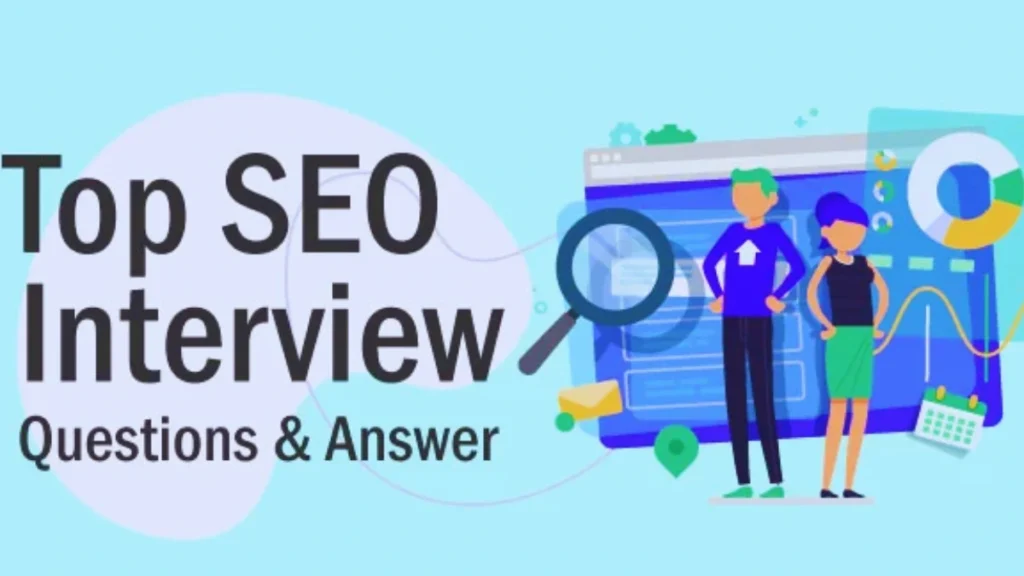In the realm of digital marketing, Search Engine Optimization (SEO) is a critical component for driving organic traffic and improving online visibility. As businesses seek to enhance their digital presence, hiring competent SEO professionals becomes essential. This article provides a comprehensive guide to SEO interview questions, helping employers identify candidates with the right expertise and skills.

Free Sources and Tools for SEO Interview Preparation
| Source/Tool | Purpose | Link |
| Google Search Central | Learn SEO best practices directly from Google | |
| Ahrefs Free SEO Tools | Offers tools like keyword research and backlink checkers | |
| SEMrush Blog | Insights on SEO concepts and strategies | |
| HubSpot Academy | Free certification courses for SEO basics | |
| Moz Learn SEO | Comprehensive SEO learning guides |
Types of SEO Interview Questions
1. General SEO Knowledge
- What is SEO, and why is it important?
- Explain the differences between white-hat, black-hat, and gray-hat SEO.
2. Technical SEO Questions
- How do you optimize a website’s crawlability?
- What are canonical tags, and how do they prevent duplicate content issues?
3. On-Page and Off-Page SEO
- How do you write effective meta descriptions?
- What are the key components of a successful link-building strategy?
4. Analytics and Tools
- How do you use Google Analytics to track SEO performance?
- Explain the purpose of Google Search Console.
5. Scenario-Based Questions
- A website’s traffic has dropped significantly. How would you diagnose and fix the issue?
- How would you optimize a website for local SEO?
Basic Level Questions
Q: What is SEO?
SEO is the process of optimizing a website to improve its visibility in search engine results, drive traffic, and enhance the user experience.
Q: Explain the difference between on-page and off-page SEO.
A: On-page SEO involves optimizing elements on the website, such as content and meta tags, while off-page SEO focuses on external factors like backlinks and social signals.
Intermediate Level Questions
Q: What are core web vitals, and why are they important?
A: Core web vitals are metrics that measure a site’s loading speed, interactivity, and visual stability, directly impacting user experience and rankings.
Q: How do you conduct keyword research?
A: By using tools like Google Keyword Planner or SEMrush to identify high-volume, low-competition keywords relevant to the target audience.
Advanced Level Questions
Q: How would you handle a sudden drop in organic traffic?
A: By analyzing changes in search algorithms, checking Google Search Console for penalties, and reviewing site performance metrics for technical issues.
Q: How do you recover from a Google penalty?
A: Identify the cause using tools like Search Console, fix the issues (e.g., remove bad backlinks), and request a reconsideration.
Tips to Ace an SEO Interview
- Research the company: Understand their website, target audience, and SEO challenges.
- Stay Updated: Be familiar with the latest SEO trends and Google algorithm updates.
- Practice Problem-Solving: Prepare answers for technical and scenario-based questions.
SEO Tools Commonly Asked in Interviews
| Tool | Purpose |
|---|---|
| Google Analytics | Tracks website traffic and user behavior. |
| Google Search Console | Monitors site health and search performance. |
| Ahrefs | Conducts backlink analysis and keyword research. |
| SEMrush | Provides competitive analysis and site audits. |
| Screaming Frog | Identifies technical issues, such as broken links. |
Fundamental Concepts of SEO
- What is SEO and why is it important? SEO (Search Engine Optimization) is the process of optimizing a website to improve its visibility on search engines, thereby attracting more organic traffic.
- Explain the difference between on-page and off-page SEO. On-page SEO involves optimizing elements within a website, such as content and meta tags. Off-page SEO focuses on external factors, like backlinks.
- What are meta tags and why are they important? Meta tags are HTML elements that provide information about a webpage to search engines and visitors. They are crucial for SEO because they influence how search engines index and display content.
Technical SEO Interview Questions
Understanding of Technical Aspects of SEO
- How do you perform a technical SEO audit? A technical SEO audit involves analyzing a website’s technical elements, such as crawlability, indexability, site speed, mobile-friendliness, and structured data.
- What are canonical tags and why are they used? Canonical tags indicate the preferred version of a webpage to prevent duplicate content issues. They help search engines understand which version to index.
- Explain the concept of crawl budget. Crawl budget refers to the number of pages a search engine crawls and indexes on a website within a given timeframe. Optimizing crawl budget ensures important pages are indexed.
On-Page SEO Interview Questions
Focus on On-Page Optimization Techniques
- How do you optimize content for SEO? Content optimization involves using relevant keywords, structuring content with headers, including internal and external links, and ensuring readability.
- What is the importance of title tags and meta descriptions? Title tags and meta descriptions influence click-through rates (CTR) by providing a concise summary of a webpage’s content in search engine results.
- How do you handle duplicate content issues? Duplicate content can be managed by using canonical tags, 301 redirects, and ensuring unique content across pages.
Off-Page SEO Interview Questions
Understanding of Off-Page SEO Strategies
- What are backlinks and why are they important? Backlinks are links from other websites to your site. They are important for SEO because they signal to search engines that your content is valuable and authoritative.
- How do you approach link building? Link building involves acquiring high-quality backlinks through strategies such as guest posting, outreach, and creating shareable content.
- Explain the significance of domain authority and page authority. Domain authority (DA) and page authority (PA) are metrics that predict a website’s ability to rank on search engine results pages (SERPs). Higher DA and PA indicate stronger SEO potential.
Keyword Research Interview Questions
Ability to Conduct Effective Keyword Research
- What tools do you use for keyword research? Common tools include Google Keyword Planner, SEMrush, Ahrefs, and Moz Keyword Explorer.
- How do you determine the target keywords for a website? Target keywords are determined by analyzing search volume, competition, and relevance to the website’s content and audience.
- Explain the concept of keyword difficulty. Keyword difficulty measures how challenging it is to rank for a specific keyword, considering factors like competition and SERP features.
SEO Analytics and Reporting Interview Questions
Skills in Using SEO Tools and Interpreting Data
- Which SEO tools do you prefer and why? Preferred tools might include Google Analytics, Google Search Console, Ahrefs, and SEMrush due to their comprehensive data and insights.
- How do you measure the success of an SEO campaign? Success is measured by tracking key performance indicators (KPIs) such as organic traffic, keyword rankings, conversion rates, and ROI.
- Explain the importance of organic traffic in SEO. Organic traffic refers to visitors who find a website through unpaid search results. It is a critical indicator of SEO success and overall website health.
Advanced SEO Interview Questions
Deep Understanding of Advanced SEO Concepts
- What is the impact of page speed on SEO? Faster page speeds enhance user experience and are favored by search engines, leading to better rankings.
- How do you optimize a website for mobile SEO? Mobile SEO involves ensuring a website is mobile-friendly, with responsive design, fast loading times, and optimized content for mobile devices.
- Explain structured data and its importance in SEO. Structured data uses schema markup to help search engines understand content and provide rich snippets, improving visibility in SERPs.
Behavioral SEO Interview Questions
Assessing the Candidate’s Problem-Solving Skills and Experience
- Can you describe a challenging SEO project you worked on and how you handled it?
- Look for examples where the candidate identified issues, implemented solutions, and achieved measurable results.
- How do you stay updated with the latest SEO trends?
- Candidates might mention following industry blogs, attending webinars, participating in forums, and continuous learning.
- Explain a time when you successfully improved a website’s ranking?
- Assess their ability to develop and execute strategies that positively impacted rankings.
Scenario-Based SEO Interview Questions
Evaluating Practical Application of SEO Knowledge
- Given a scenario of a sudden drop in rankings, how would you troubleshoot the issue? Steps might include analyzing Google Search Console for penalties, checking for technical issues, and reviewing recent changes.
- How would you handle a client who is not seeing immediate SEO results? Emphasize the importance of patience in SEO and provide regular updates on progress and future plans.
- What steps would you take to optimize a new website from scratch? The process includes conducting a site audit, performing keyword research, optimizing on-page elements, building backlinks, and monitoring performance.
SEO Interview Questions for Fresher, Intermediate, and Advanced Levels
| Level | Questions |
| Fresher |
1. What is SEO and why is it important?
2. Differentiate between on-page and off-page SEO. 3. What are meta tags in SEO? 4. Explain the difference between organic and paid results. 5. What is a keyword, and why is it crucial in SEO? |
| Intermediate |
1. How do you perform keyword research?
2. What is the importance of a robots.txt file? 3. Explain canonical tags and their significance. 4. How do you analyze a website’s backlink profile? 5. What is the importance of page speed in SEO? |
| Advanced |
1. Explain the concept of structured data and its SEO benefits.
2. What are Core Web Vitals, and how do they impact rankings? 3. How would you recover from a Google algorithm penalty? 4. Describe your approach to technical SEO audits. 5. How do you optimize a multilingual website for SEO? |
FAQs for SEO Interviews
- How do you stay updated with SEO trends?
By following industry blogs like Search Engine Journal and attending webinars. - What is your experience with SEO tools?
Proficient in tools like SEMrush, Ahrefs, and Google Analytics. - How do you measure SEO success?
Through metrics like organic traffic, conversion rate, and keyword rankings. - What’s the most challenging SEO problem you’ve solved?
Addressing sudden ranking drops by diagnosing technical errors and recovering visibility. - What are your favorite SEO strategies?
Content optimization, local SEO tactics, and data-driven decision-making.

